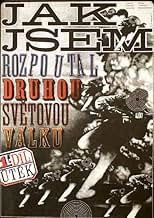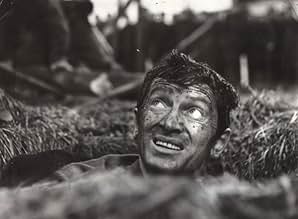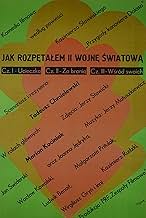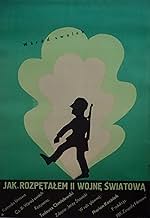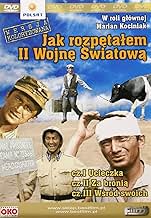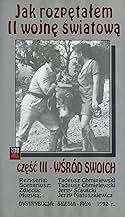Wie ich den zweiten Weltkrieg beendete
Originaltitel: Jak rozpetalem druga wojne swiatowa
- 1970
- 3 Std. 44 Min.
IMDb-BEWERTUNG
8,0/10
4033
IHRE BEWERTUNG
Füge eine Handlung in deiner Sprache hinzuThe adventures of unlucky Polish soldier Franek Dolas during world war II. In September he escapes from Stalag and goes to France. After that he fights in Africa and Europe.The adventures of unlucky Polish soldier Franek Dolas during world war II. In September he escapes from Stalag and goes to France. After that he fights in Africa and Europe.The adventures of unlucky Polish soldier Franek Dolas during world war II. In September he escapes from Stalag and goes to France. After that he fights in Africa and Europe.
- Regie
- Drehbuch
- Hauptbesetzung
Empfohlene Bewertungen
The film is one of classic Polish comedies, often aired in Polish TV, and I like it quite much. The main hero is Polish soldier Private Franek Dolas, a charming wangler, who is convinced, that he had started World War Two with his accidental shot (it is a bravura life role of Marian Kociniak). He escapes from a POW camp, and then desperately tries to join the Polish Army, being organized in Great Britain. The film is quite long three-part trilogy, but we follow adventures of Private Dolas from 1 September 1939 towards the end of the war, across Nazi occupied Europe, Middle East and North Africa. And there is also a romance plot in last part.
The whole story is inspired by fates and stories of many Polish soldiers, who escaped from occupied country and got to French or British allies to continue fighting. It was truly a difficult task during the war, because they had to travel illegally through neutral or Nazi-allied countries, avoiding imprisonment or internment. Many of them found themselves eventually in North Africa, where Polish units fought on British side in 1941-1942 against Germans and Italians. One patrol even captured Italian military bordello indeed...
Since Franek Dolas travels through different countries, a humour mainly explores national stereotypes and cultural clashes, but in rather gentle and non-derogatory way. So, the Germans are unable to write down an overcomplicated fake Polish name (Brzeczyszczykiewicz), the Yugoslavians are hospitable, while the British are stiff and care about nothing during a tea time (it also was an experience of Polish soldiers, raised in different culture). On the other hand, the Poles, personalized by the main hero, are reckless and always get into trouble. In fact, Private Dolas succeeds in many things only by accident. French captain is always drunk on wine and wants to fight for Marshall Petain - but on the other hand, his soldiers join the Free French to continue fighting. The Italians try to surrender, or they fight only for their women - but we also see brave Italian commandos. A great and remarkable thing in this film is, that all characters speak their own languages, what makes language barriers obvious, and increases reality feeling.
The film was made as black and white, but gained much thanks to a digital colorization.
The whole story is inspired by fates and stories of many Polish soldiers, who escaped from occupied country and got to French or British allies to continue fighting. It was truly a difficult task during the war, because they had to travel illegally through neutral or Nazi-allied countries, avoiding imprisonment or internment. Many of them found themselves eventually in North Africa, where Polish units fought on British side in 1941-1942 against Germans and Italians. One patrol even captured Italian military bordello indeed...
Since Franek Dolas travels through different countries, a humour mainly explores national stereotypes and cultural clashes, but in rather gentle and non-derogatory way. So, the Germans are unable to write down an overcomplicated fake Polish name (Brzeczyszczykiewicz), the Yugoslavians are hospitable, while the British are stiff and care about nothing during a tea time (it also was an experience of Polish soldiers, raised in different culture). On the other hand, the Poles, personalized by the main hero, are reckless and always get into trouble. In fact, Private Dolas succeeds in many things only by accident. French captain is always drunk on wine and wants to fight for Marshall Petain - but on the other hand, his soldiers join the Free French to continue fighting. The Italians try to surrender, or they fight only for their women - but we also see brave Italian commandos. A great and remarkable thing in this film is, that all characters speak their own languages, what makes language barriers obvious, and increases reality feeling.
The film was made as black and white, but gained much thanks to a digital colorization.
this film is so funny and show so much of 2ww in parodic way .
i love it for this and i love the lead hero who is playing with german soldiers :D
its 1 of my most favorite movies . u must watch it :)
i love it for this and i love the lead hero who is playing with german soldiers :D
its 1 of my most favorite movies . u must watch it :)
It's a story about a polish rifleman - Franek Dolas.It begins on 1st October of 1939 when Nazis invade Poland.Generally the whole movie is divided into three episodes.In the first one Franek gets himself into German pow camp.He is making his best trying to escape but everything he does gets him only into more trouble.Frankly speaking Franek is a kind of guy that is always getting into some kind of trouble.When he wants to do something right the result is opposite every time. Through all three episodes we can see Franek's funniest adventures in occupied Poland,Yugoslavia,Italy,few other European countries and even Africa where he joins French Foreign Legion. I think that it should be very interesting and funny for Europeans to see what the Poles think about them and why we sometimes laugh about English or Italians for example :P
As a Polish speaker and fan of WW2 films, this movie ticks all the boxes you would want from a WW2 adventure/comedy. One may describe the film as a cross between 'The Great Escape' (1964) and 'Forrest Gump' (1994). A simple mans comedic journey through a tumultuous time period in history, driven by his impassioned will to fight for his country.
In Polish the movie was called "Jak rozpetalem druga wojne swiatowa". Translated into Russian, the name of the film looks like - "How I Unleashed World War II". But in our country it was released under the title "The adventures of Dolas the cannoneer".
Judging by the extremely small number of reviews on this film on IMDB and on the complete absence of references to this film on the Rotten Tomatoes website, this picture is practically unknown in the world. Except, perhaps, for Poland and Hungary. There is no data on the demonstration of the film in the USSR, but I definitely remember that I watched it being pupil of of either the 6th or 7th grade, i.e., somewhere in the beginning of 70-s.
And the second time I watched this movie recently. And it was interesting to compare my impressions with me then, half a century younger, and today.
I remember that then I laughed wildly at the session. A lot of funny moments in this movie.
Today, voluntarily or involuntarily, other points attracted attention. Well, firstly, I remember exactly that then, in the beginning of the 70s, the film consisted of two episodes and lasted a total of somewhere from two and a half to three hours. The full version, which I watched recently, lasts almost 4 hours and consists of 3 episodes. This is how much was cut out of the film by Soviet censorship! Weigh roughly - a whole third of the film. However, neither then nor today would I be able to sit in the movie theater for 4 hours on this film. It's good that now there is a lot of opportunities to watch movies at home on the couch.
Secondly, during a recent viewing, I drew attention to a phrase uttered by one of the female characters when the action took place in Yugoslavia: "The Germans will be here soon. They have already occupied Hungary." Then, in childhood, my friends and I did not pay much attention to this phrase. Of course, bad fascists occupied good Hungary. This is today, when we know that Hungary was the original and most faithful satellite of Nazi Germany and fought against the Red Army until the very end, when even the Germans themselves began to give up, this phrase cuts the ear. Since the Nazis had no need to "occupy" Hungary. At least, in 1939-1940.
Thirdly, I do not remember whether the episode with the Polish officers in the POW camp was present in the version that was shown in Soviet times, or not. Most likely not. Now compare with numerous photo documents about the camp conditions for Soviet officers in German camps for POWs. And as they say, feel the difference.
Such a comparison is especially relevant today, when some Polish, and not only Polish, politicians decided to attribute the beginning of the World War II exclusively to Germany and the Soviet Union.
However, I think that everyone who watched this film in the 70s and watched it today will be able to find other changes in their impressions.
Wusstest du schon
- WissenswertesThe film is unique in terms of language realism: members of each nationality, encountered by a main hero on his way, speak their own language (German, Serbo-Croatian, French, Italian, English), what makes his adventures and communication problems more realistic.
- PatzerWhen the film was colorized in 2000, the Yugoslav flag was miscolored, with green in the place of blue.
- Zitate
Pvt. Franek Dolas: B-but our place is in the Polish army! We must fight for Poland!
Sgt. Kiedros: And for which Poland do you want to fight for?
- Alternative VersionenAlso shown in computer colorized version. This version was prepared by "Dynacs Digital" and has never been released theatrically. It was first shown by TV Polsat.
- VerbindungenReferenced in Ich hasse Montage (1971)
Top-Auswahl
Melde dich zum Bewerten an und greife auf die Watchlist für personalisierte Empfehlungen zu.
- How long is How I Unleashed World War II?Powered by Alexa
Details
- Erscheinungsdatum
- Herkunftsland
- Sprachen
- Auch bekannt als
- How I Unleashed World War II
- Drehorte
- Zgierz, Lódzkie, Polen(POW camp)
- Produktionsfirma
- Weitere beteiligte Unternehmen bei IMDbPro anzeigen
- Laufzeit
- 3 Std. 44 Min.(224 min)
- Farbe
- Sound-Mix
- Seitenverhältnis
- 2.35 : 1
Zu dieser Seite beitragen
Bearbeitung vorschlagen oder fehlenden Inhalt hinzufügen

